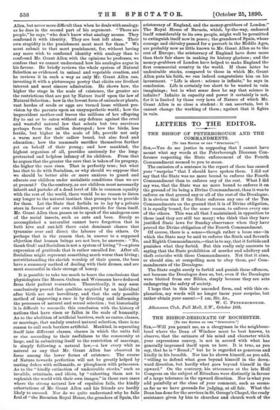LETTERS TO THE EDITOR.
THE BISHOP OF PETERBOROUGH AND THE COMMANDMENTS.
[To THE EDITOR OP THE " SPECTATOR."1
Sia,—You do me justice in supposing that I cannot have meant what my words at the Peterborough Diocesan Con- ference respecting the State enforcement of the Fourth Commandment seemed to you to mean.
The omission of a sentence in the report of them has caused your " surprise " that I should have spoken them. I did not say that the State was no more bound to enforce the Fourth Commandment than to enforce any of the rest. What I did say was, that the State was no more bound to enforce it on the ground of its being a Divine Commandment, than it was to enforce on that ground any or all of the rest of the Decalogue. It is obvious that if the State enforces any one of the Ten Commandments on the ground that it is of Divine obligation, it is equally bound, for the same reason, to enforce every one of the others. This was all that I maintained, in opposition to those (and they are still too many) who think that they have justified State laws for Sunday observance when they have proved the Divine obligation of the Fourth Commandment.
Of course, there is a sense—though rather a loose one—in which the State may be said to enforce the Sixth and Seventh and Eighth Commandments,—that is to say, that it forbids and punishes what they forbid. But this really only amounts to saying that the State prohibition of murder and adultery and theft coincides with these Commandments. Not that it aims, or should aim, at compelling men to obey them, quci Com- mandments of the Decalogue.
The State ought surely to forbid and punish these offences, not because the Decalogue does so, but, even if the Decalogue were blotted from our Bibles, simply because they are acts endangering the safety of society.
I hope that in this their amended form, and with this ex- planation, my words will no longer incur your surprise, but rather obtain your assent.—I am, Sir, &c.,
W. C. PETERBOROUGH.
Athenaeum Club, Pall Mall, S.W., October 18th.






































 Previous page
Previous page